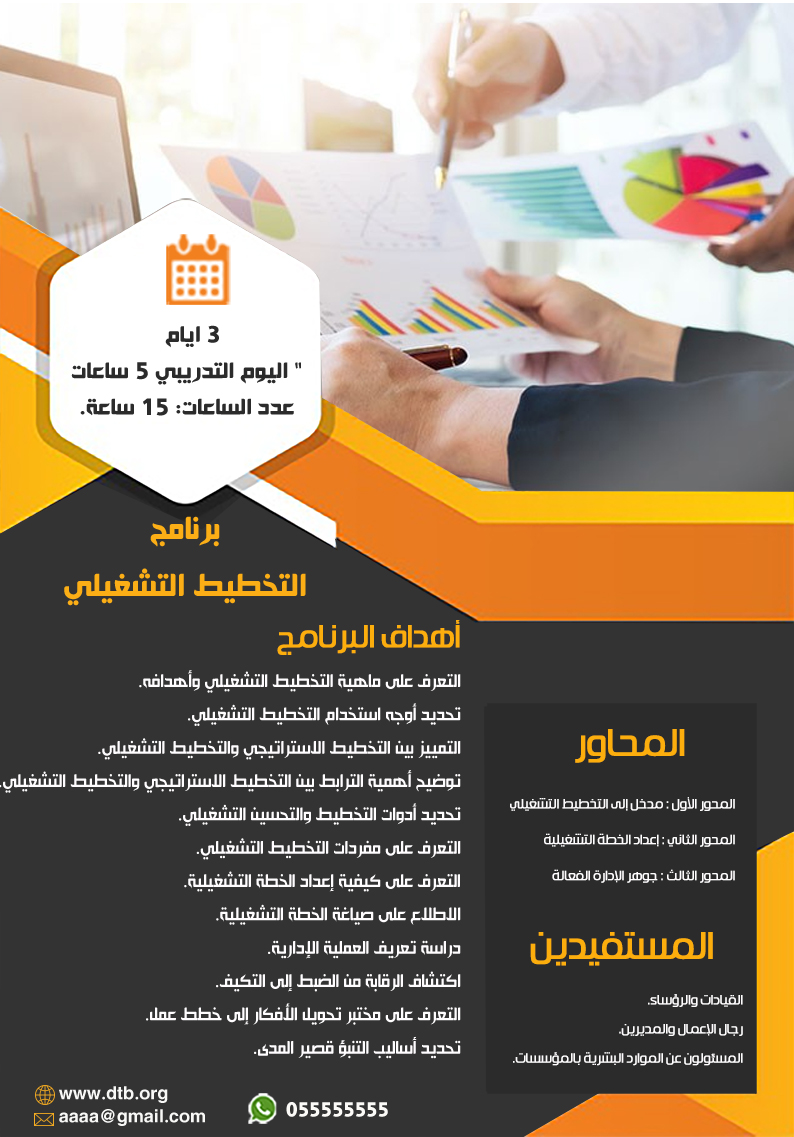-
Category
تطويري
-
Presence
200 SAR
-
online
150 SAR

Human resource planning
It can be said that developing governmental or private institutions, improving performance, and developing capabilities for human resources are among the basic goals pursued by institutions through planned and deliberate change. Today, these institutions
Details
introduction:
It can be said that developing governmental or private institutions, improving performance, and developing capabilities for human resources are among the basic goals pursued by institutions through planned and deliberate change. Today, these institutions face a set of challenges and threats related to efficiency, effectiveness, and profitability, as well as challenges related to the renewable environment, high intensity of competition, globalization, comprehensive quality, balanced performance, building work teams, interest in creativity and excellence, changing customer desires and levels of ambition, and there is a challenge related to maintaining consistency between organizational dimensions such as organization culture. Organizational climate, strategic planning, confronting renewable technology, and the information and knowledge revolution. Institutions will not be able to face these challenges except through their distinguished and creative human resources that can lead our Arab organizations and institutions to change, innovation, development, leadership, excellence, excellence, and standing in the first ranks and not in the ranks of ordinary people.
Program Goals:
At the end of the training program, participants will be able to:
Judging the extent of human resource contributions to achieving the organization's goals
Identify the characteristics of creative and distinguished people that organizations need at work
Learn about the human resources management system
Identify the pillars on which human resource managers are based
Acquiring administrative excellence skills and evaluating and improving work results
Learn personal interview skills
Know how to conduct functional tests
Know how to evaluate employee performance
Refutation of the inevitability of excellence and improvement of work results.
the target audience:
HR managers
Manpower planning managers.
General managers
Training and career development managers
Personnel managers
All departments concerned with developing human resources and preparing competencies
Everyone who wants to develop their skills and experience and sees the need for this course.
The general themes of the program:
First day:
Administrative excellence skills, evaluation and improvement of work results:
A system for evaluating and improving work results
Excellence and administrative improvement in light of global changes
Aspects of excellence and administrative improvement
The inevitability of excellence and improvement of work results
The basic principles on which excellence and administrative improvement are based
- Intellectual starting points and basic principles of human resource management:
The pillars on which human resource managers rely to achieve job excellence and creativity
Concept, significance and objectives
Human resources management system
Different approaches to human resources management developments.
Scientific principles and foundations for human resource management
the second day:
- Manpower Planning:
concept and significance
Stages of manpower planning
Who plans human resources
Means of attracting a creative workforce
Skills inventory and human resource forecasting methods
Difficulties in human resource planning and how to face them
the third day:
Selection, recruitment and interview skills:
Selection and recruitment system
The scientific steps of the selection and recruitment process
Conducting psychological, practical and written tests
Personal interview skills
Testing values as a basis for placing the right person in the right jobs
Characteristics of the creative and distinguished
Functional calendar of human resources performance:
job performance standards
Importance and uses
Develop job performance measures
Methods of evaluating job performance
The biases of raters and how to overcome them
calendar operators.
Practical cases and exercises.
the fourth day:
Features and challenges of the era of globalization and its impact on the management of organizations:
Features of the era of globalization and its impact on organizations.
Technological, economic, cultural and social challenges.
Future vision in light of the challenges of the era of globalization.
Director keys to global.
Human resources management and its role in the light of globalization
Human resource management goals.
HR management tasks.
Challenges facing human resource management.
The role of human resources management in light of globalization.
The fifth day:
- Planning human resources needs in light of the challenges of the times:
The importance of human resource planning
Factors affecting the human resource planning process
The basic human resource planning model.
Human resource planning steps.
HR forecasting methods.
Analysis of the supply and demand side of human resources.
the sixth day:
- Analysis of work and description of jobs "entrance to raise the level of performance":
Job analysis and its importance in modern organizations.
Analysis of work and administrative performance.
Methods of job analysis in different organizations.
Work analysis methods.
Job descriptions and building optimal performance levels.
the seventh day:
- Planning and developing the career path of human resources:
The importance of career path planning in organizations.
The main variables affecting career path planning.
Career planning responsibility.
Methods used to discover career paths.
Route maps or staff ladder.
Career path management.
Eighth day:
- Strategic management of human resources and administrative and organizational development:
The importance of strategic management of human resources.
Administrative development and its components in modern organizations.
management development goals.
Methods and methods of administrative development.
Organizational development and its objectives.
The main entrances to organizational development.
The ninth day:
Building the leadership strategy by applying the balanced scorecard "B.S.C".
Strategic challenges in Arab organizations.
management and performance measurement.
Standards and indicators for measuring performance.
Stages of establishing performance measurement systems.
Balanced Scorecard.
Elements of the balanced scorecard.
The main axes of the balanced scorecard system.
Requirements for the success of the balanced scorecard application.
Day 10:
- The role of the "Six Sigma" approach in improving and developing the outputs of business organizations:
What is meant by "6 sigma" and its importance in modern organizations.
Methodology "6 sigma" and its relationship to quality
Course information
- Course start date : 2023-04-22
- Duration : 3
- Hours: 15
- Number of seats: 500
- studying days : from الأحد to الخميس
- Study time : 19:00 - 22:00
- Training period: مسائي
- training type: اونلاين

 EN
EN AR
AR
